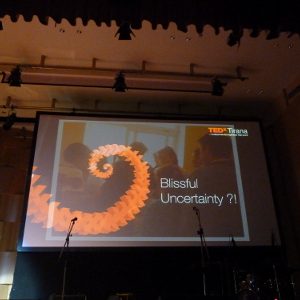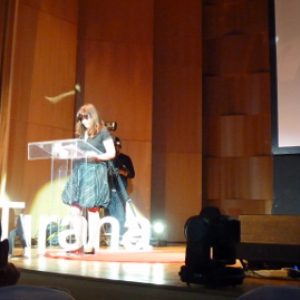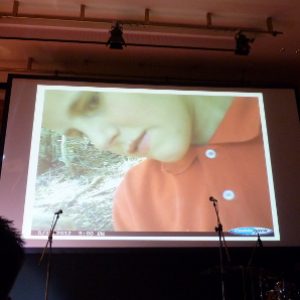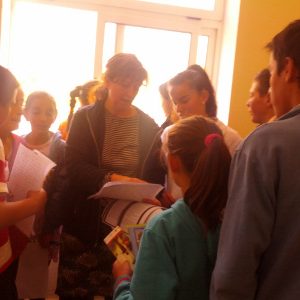Promises: TEDx Tirana Lecture
on the topic of “Blissful Uncertainty” Tirana, 3 May, 2014
I would like to talk to you about children.
I do not have children. I’m not a teacher. I don’t work with children. I am not myself a child, although I sometimes play one in my everyday life. When I was an actual physical child, I didn’t much like other children. I thought they were noisy, irrational, prone to cruelty, selfish and often untrustworthy. I much preferred books. Animals were great – straight forward in their communication, capable of loyalty and pure affection. Nature – even better – big, beautiful, and often empty. Quiet. Except when exhibiting some smashing temper tantrum, and then even better. I have fond memories of sitting on the roof of my house in thunderstorms as a child, when the fury of nature seemed a happy echo of the fury in my own adolescent heart. As the child says in a Christmas in Wales “I never hear bells inside me. Only thunder sometimes.”
Thus it is with some surprise that I find my adult life has been constantly invaded by children.
I am at their mercy completely. They find me, colonize me. They stage friendly takeovers of my life. I find myself sticking up for them, against my will. They befriend me, the little tyrants, and appoint themselves my teachers, guardians, champions and owners. I am apparently helpless to resist them. They just turn up and even when I turn cranky and rage at them they simply retreat to a safe distance and wait. I can feel them waiting, and inevitably I give in, and then they come rushing back to boss me around some more. They are like a river I swim hopelessly against. A priestly friend once told me: They like your emotional honesty.
Nice Rhetoric, but what am I actually talking about?
Well, for example. There was a boy in New York who colonized my bookstore. Things were clearly unsettled in his home, to put it mildly. I used to work late, and he would show up later. Eleven o’clock, 12 o’clock. One o’clock in the morning, the rat-a-tat-tat would come on the door and I’d look up to see his pale face peering in. What could I do? I opened the door and let him in. I wondered of course where his parents were. Wondered why there seemed to be no check on his nocturnal wanderings. It didn’t seem right to me, but still, if wander he would, better he wander to a warm if dusty bookstore, an available if oddly solitary bookseller.
He seemed to me to be strangely obsessed with justice for a 13 year old. He was constantly making up laws, chewing over politics. This was the time of one of the Bush wars and military conscription was being mulled over. Many nice New York liberals were actually pushed so far that there was a strange mini-mass migration to Canada. The boy told me one night that if the draft was instituted he would refuse to fight. He would not flee, would not dodge, but would stay and even go to jail, he said, holding his tiny 13-year-old body upright, stiff with conviction.
I’ve probably read too many books. It makes me a sucker for gestures, for the bon mot at the right time, for the epiphany. It was clearly the right thing to say, so I said it: “If anyone ever locks you up,” I said, “I will come and get you out.” His eyes locked on mine. A question. A sort of fearful blossoming. It wasn’t enough. He looked at me. A question. “If I have to knock down walls, I will get you out,” I said. And we sat, in an oddly calm moment, and looked at each other. Without any other words said, I knew I’d made a promise.
This is absolutely and certainly why some weeks or months later, when the crisis came in the family, which of course it did, and the boy showed up shivering, on the edge of tears, in shock really, and I saw that he wasn’t going home again – not that night – that I remembered my promise and called his parents (I knew them vaguely). “He seems upset,” I said (with his permission). “We’re ALL upset” said his mother. Yes, well. “Would it help if he came and stayed with me tonight?” I expected the polite, slightly appalled negative. I expected to be snubbed, and if truth be told, I probably hoped for it. But still. A promise is a promise.
“Okay,” said his mother. I bought him a toothbrush on the way home. He stayed for almost 3 years. It was a very small apartment.
This is probably the most extreme example of the invasion of my life by youth. But it certainly isn’t the only one.
Now I live in Valbona, in a small, remote, almost medieval village in Tropoja, Northern Albania. Space here is defined by families. There isn’t much of what in America we would call “public space.” Within the houses of a given family almost no space is private. Everything is public. And yet between families a decorous distance is kept, mediated by elaborately defined rites of visiting. Children are precious here, partially because people are of a necessity less mercenary – there isn’t much to be mercenary with – so more attention is focussed inwards, onto family. And in some ways more mercenary, in the sense that children are what would elsewhere be called ‘a retirement plan.’ They are necessary. Precious. An investment of the most tender kind. At any rate, whether it’s a case of practical geography or conscious policy, children are kept close to home here. Unless they’re in the mountains, herding goats, they aren’t encouraged to wander around.
You’d think I’d be safe.
But NO.
The Invasion has taken place on two fronts, independently, if coincidentally simultaneously launched. I am alas accountable for both.
The first is the fault of camera trapping. The excellent Albanian Environmental NGO PPNEA has trusted me for 4 years now with wildlife cameras. These cameras are automatic, triggered by a combination of warmth and movement – so if in other words, if you tie a camera to a tree with a supply of reasonably strong batteries, you will catch pictures of bears, wolves, chamois, boars and “lesser” creatures (including us from the knees down) as we all go about our daily business. I put a camera on Maja e Gjarperit, near the Livadhet or meadows there. Over six months or so this camera unfortunately caught mostly cows (149 in one blockbuster month) and people, and one very curious, blond-haired boy. I have pictures of him walking past. Pictures of him doubling back, pictures of him peering into the camera with his head tilted one way, and yet more pictures of him with his head tilted the other. I never ran into the boy, while the camera was up, but after a while it became clear that he was checking on it. It looked as if he had a certain proprietary interest.
After a while, I decided to give up on this camera and so walked up one spring day to take it down. I half expected the blond-haired boy to pop out from behind a tree, but he didn’t. Alone, I felt uncomfortable as I worked, and after a bit I recognized the uncomfortable feeling as guilt. The boy had clearly taken an interest in the camera. Perhaps he’d come to look on it as “his.” It was on his path. In a way I and my camera had been his guests. How would he feel when he arrived the next time to visit the camera and found it vanished? How would I feel in his place? I imagined feeling surprised, disappointed, hurt and then angry. I took a minute. Yes, guilty. That was the feeling. I felt like a thief. Like a bad guest. I sat down, in the middle of the woods, and wrote him a note: “Boy!” I said “I have taken down the camera. Please feel free to visit me and see the pictures. This is my address _____ and this is my phone number _______. Thank you for looking after the camera. Sincerely, etc.” I pinned the note to the tree, in place of the camera. Of course, I didn’t really think he’d visit me.
Of course he did.
And that is how I gained my first Albanian child invader. But an invitation is a promise. And a promise is a promise. Now he is my best friend. We go in the mountains often. He maintains his own camera traps. We’ve marked trails and made signs, and just a few weeks or months ago I ate dinner with his family on his birthday, which my own Albanian family thought was distinctly odd.
He calls me six times a day on average. “WHAT?” I answer the phone “WHAT DO YOU WANT? I’M BUSY!” (that emotional honesty). “Oh,” he says, “I forgot why I called.” He says “Don’t worry – I’ll call you back.” and hangs up cheerfully.
The next front of the Albanian children’s invasion of my very own personal and private life was more orthodox in origin – but the extent to which it’s gotten out of hand is certainly my own fault. I was asked by the YEM program to teach English at the local school for one hour a day for several months.
She should have known better, you’ll be saying to yourselves, and of course I did and of course I went anyways.
At first – of course – it was much as you might expect. I was nervous, they were distrustful and suspicious. Some were suspiciously enthusiastic, if completely indisposed to actually studying, as if they could learn English by osmosis. Which, come to think of it, they probably could. But it was all fairly painful. We limped along for several months, until one day in class the naughty boys seemed especially restless, clustered and crammed around a single tiny desk. As I turned to write on the (tiny, faded) blackboard, I caught the blossom of an artificially bright flash of light on their desktop. A crackling, cracking sound. A puff of smoke. A smell.
I am human. I had a moment of wondering if I should ignore it. If I could get away with ignoring it. I heard sniggers.
I turned back.
“What’s that?” I asked brightly.
The boys nudged each other. The more sophisticated ones had a slightly hostile impassive look. The less sophisticated giggled.
“Come on,” I said again, smiling, “What is it?”
The cockiest child was somehow shoved forward without anyone moving. “Dinamit” he half whispered, leering.
They didn’t really respect me, or they never would have said. And even I could see it wasn’t dynamite, but just a firecracker, split open, its powder poured on the desktop and lit. Grab it or lose it now, I thought. Also thinking: Dynamite – that’s not supposed to be hard to make – what is it? Salt Petre, something . . . nitrogen? Didn’t they make dynamite from seaweed in Mysterious Island? Is that what they’re interested in then? Could I teach them that? In English?
I said the only thing that was really possible, which even you will acknowledge, if you think about it. I said:
Do you have more?
So we lit the firecrackers and threw them in the corner of the classroom and there was a great explosion and the girls were shrieking and running around and even I shrieked a little for fun and the boys were grinning even if they did get a little singed. And later one of the other, proper teachers said to me, with great kindness and concern, “Your class seems a little . . . . noisy?”
And the children huddled behind me and I said “Well, you now, it’s a language class – we’re – um – talking.” I smiled apologetically. “It can probably get noisy.”
And after that they were as good as gold. Not surprising, really – half of them probably expect to be blown up in class.
But it’s gone on from there.
“I think you need a library,” I said to them one day. “You know – books – sofas. Plants. Reading Lamps.” I have, it must be said, a hopelessly 19th century taste. I heard the girls nudging each other. “Sofas,” she says! “Is she crazy?” “It’s Virginia Woolf,” I said to them “Your body needs to be comfortable, so your mind can be free.”
“Aiiiiii,” said Alfred, not for the first time, and certainly not for the last. “Don’t say these things to them – they’ll expect it.” And he was right of course. I’m not sure if planting an idea in someone’s head is exactly a promise, but I suspect it is, and certainly every time I saw them they said “When will we work on the library? Will we work on it today?”
A promise – even the idea of a promise – is still a promise.
And it isn’t so hard to make a library, when you start from nothing. Ten euros slipped to me by a tourist bought wood, which turned into shelves. Other monies bought paint. The children filled the cracks in the walls of an enormous empty classroom, and – a little lopsidedly – turned the walls a warm and dreamy yellow. A tremendous and unlooked for gift from a charity in Switzerland filled the shelves with books and bought beautiful tables and chairs – quality furniture, and science kits. The day the books arrived my friend Rea and I said to them “You should really know more about tourism. There’s wonderful tourism in Albania . . . Berat!” (I’d just been there.)
“Aiiiiii” said Alfred, and he was right.
“When are we going to Berat?” they asked me in a dozen tiny voices, beginning to be convinced that they could do anything.
“Well you know,” I said, “I’m sure we could. We just write a proposal and perhaps next year . . . “
“NEXT year?” a dozen little voices shrieked. “How about May? May is good!“
This was in April, mind you.
“Look,” I said – “I don’t think it’s possible,” I said.
COME ON, they said. “Can’t you write a proposal?” said the littlest one.
“Certainly Not,” I said. “I’ve been to Berat. You want to go to Berat? You write the proposal.”
They looked fierce, and a little crestfallen.
“Okay fine,” I said. “I’ll tell you how to write the proposal, but you write it.”
And do you know what? They went.
Not in May, but in June.
From there it’s mushroomed all out of proportion. If I’m not taking one group of children somewhere I’m taking another.
What did I start by telling you? They’re merciless. What I didn’t tell you is this: I love them. I am so grateful for the invasion. I love their hope, their seriousness, their silliness and their beauty. I love their trust. They make me a better and a happier person than I would otherwise be. They call me on my promises. And remaining accountable to all the children I’ve known is the thing which gives me Besa, which makes me feel like an honourable person, a person of worth. Thank you, children. I hope I’ve always thanked you. More probably I’ve roared at you. Well, I thank you now, and will hope to thank you again later.
The subject today is Uncertainty. My talk has so far been about children, and it has been about promises. My point is probably this: Make promises. A promise would seem to be the opposite of uncertainty since it offers assurance, security. But we make promises without understanding them. The important thing about a promise is not how or why it is made, or what was intended at the time of its making. We cannot know when our promises will be called in. Or how. Or even what we will have to do to keep them. But the important thing about a promise is how it’s kept.
The Important thing about a promise is how it’s kept.
The Important Thing about a promise is How It’s Kept.
Please note: This was truly one of the most exciting brain days I’ve had in years. I urge you to find out more and support TEDx Tirana. The organizers, led by Iris Xholi, are all volunteers doing an amazing job. I was so moved that I’ve promised to volunteer next year. Gotta be some envelopes that need licking or something. Bravo!





